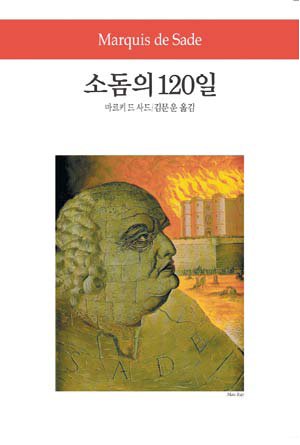 |
The Korean-language edition of French writer Marquis de Sade’s 1785 novel “The 120 Days of Sodom”(Dongsuh Press) |
The Korean-language translation of French writer Marquis de Sade’s 1785 novel, “The 120 Days of Sodom,” has been officially banned in Korea, for its “extremely violent” and “disturbing” sexual content. It is the second time that the book, dealing with orgies and torture, has been banned by the government.
The book was published here on Aug. 15 by local publishing house Dongsuh Press. Korea Publication Ethics Commission, a state review board, started investigating the book on Aug. 16, after a man posted an angry entry on the commission’s website asking for the banning of the text in Korea.
The commission called on the local publishing house to destroy all copies currently at stores on Sept. 6. The novel was first translated and published in Korea by another local publisher in 2000, and was banned for the same reason at the time.
“The book is extremely disturbing and can be harmful for the public in many ways,” said Jang Taek-hwan from the review board. “There are many acts of incest, sadism, as well as flagellation. It also depicts cruel acts of necrophilia and bestiality.”
The book tells the story of four French libertines who rape, torture and eventually murder their mostly teenage victims in an inaccessible castle to please themselves in sex orgies. The book’s local publisher, however, said it is angry about the decision, and is planning to appeal for another review of the text next week.
“I’m taking this case to court if the appeal is rejected,” Lee Yong, senior editor of Dongsuh Press, told The Korea Herald. “I’m not really sure if the Korea Publication Ethics Commission really understands this novel. Sade criticized the dark and cruel side of human nature through these cruel characters. It is full of philosophy and psychology, and is worthy of research by both literary scholars and psychiatrists.”
Popular film producer Kimjho Gwang-soo, whose works include “The Client” (2011) and “Detective K” (2010), also tweeted his criticism of the government for the decision to ban the book.
“The book is an international classic and it’s ridiculous for the government to ban it from the public,” he wrote. “This decision shows that they are going backwards in time.”
Go Geon-hyeok, CEO of indie music label the BgBg Records, whose artists include Jang Ki-ha, expressed his concern as well.
“This is clearly a case of censorship,” he tweeted. “The case is problematic even if the book weren’t a classic.”
The book is currently still available in local bookstores.
By Claire Lee (
dyc@heraldcorp.com)








